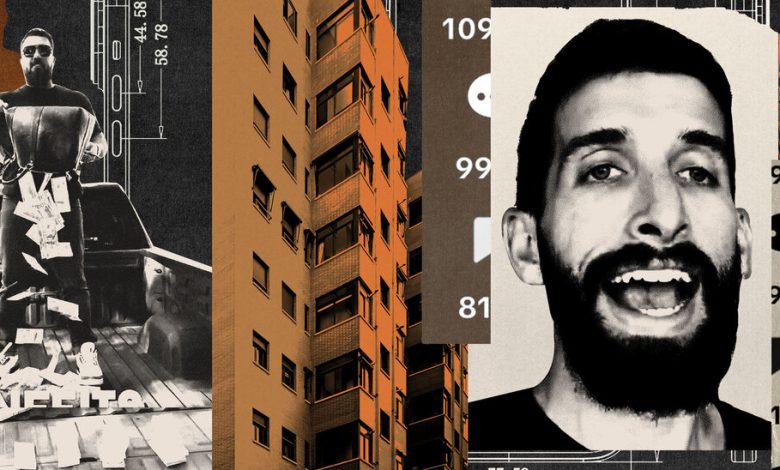The Landlords of Social Media Seem Happy to Play the Villain

A trim, bearded landlord stands on the balcony of a high-rise, the Miami skyline extending hazily behind him, and squints into his phone to read a user-submitted question. “Have I ever evicted a single mother out of one of my properties?” he says. “Oh, yes, on multiple occasions!”
The man’s name is Tom Cruz, and his video recently went viral on TikTok. “Guys, there’s nobody protected in my portfolio,” he explains. “The elderly, the disabled, the single moms.” If he doesn’t evict, he reasons, renters won’t respect him, “as a landlord or an investor.” He shares the story of a particular problem tenant. (“Ms. Carla, if you’re watching this, sorry, I’m not sorry,” he says winkingly.) According to Cruz, a property manager told him Ms. Carla hadn’t paid rent in two months, even after multiple warnings; when he checked his records, he found that he had offered to buy her out of the apartment, “cash for keys,” but she had stopped responding. So he began the process to remove her. “Three weeks later, $200 in legal fees, and she’s out on her ass with an eviction on her record.”
Cruz presents himself as an untroubled pragmatist, tough but fair, who refuses to be misused by tenants or burdened by guilt about their predicaments. In his telling, the housing market is a contest, with winners and losers: “Everyone plays a game,” he says in one video. By his account, he owns more than 650 homes across four states in the South and the Midwest, where he rents to low-income people subsidized by Section 8 housing vouchers. (The federal government guarantees the rent, and thus a majority of his income, which he says is roughly $1 million per month.) Cruz spins these operations into digital content ranging from tips for aspiring investors to plain old-fashioned yacht-flaunting braggadocio. Tenants play their own games, he warns. Some are frauds who actually own luxury vehicles and fancy jewelry. Others will gladly take advantage of your kindness. You get the sense that he would no sooner go easy on a single mother than a poker player would throw a hand just to be friendly. Business is business.
It’s no surprise that social media brims over with videos from real estate influencers. What’s astonishing is that property owners and landlords, some of the most broadly despised people in the country, are logging on to boast about the most ruthless and loathsome things they do. In one video, the protagonist of an account called Build Wealth With Gustavo laughingly bemoans the damage an evicted resident has done to his “house in the hood”; soon, he’s transforming it into an attractive $100,000 rehab project. In another, a landlord exhibits the “nightmare” of a rental trailer trashed by tenants, explaining that rents are so high “because of people like this.” Scroll on, and you might find a maintenance man dancing in the wreckage of an eviction while onscreen text explains his plans to add to the former occupant’s debt. “So who really got the last laugh,” it reads, alongside a smiley-face emoji.
I first encountered Cruz’s eviction video through an activist’s repost, accompanied by a two-word caption: “abolish landlords.” But part of the reason landlords create this content in the first place is, it appears, as a way of provoking such critics: Each video forms a rhetorical maneuver designed to cast the abolish-landlords set as ignorant of the real world. There’s a trollish, deadpan, sorry-not-sorry quality in their responses to the inevitable scolding. When, for example, a commenter upbraids Cruz for “turning a basic human need into an investment,” Cruz doubles down, comparing housing to other profitable essentials like food and water. “I think it’s the coolest investment you can make,” he says.
Housing is certainly one of the easiest markets for ordinary people to enter as owners. But it is also among the most fraught with suffering. Many people decline to rent out their properties precisely to avoid the emotional and legal entanglements that can result, knowing they might lack the stomach to, say, evict a tenant with children. Landlords like Cruz, by contrast, relish playing the villain, at least rhetorically. They depict themselves as tougher than the average person, and therefore richer. Cruz’s involvement with evictions, or any interpersonal business with the Ms. Carlas of the world, is presumably remote; others execute his decision to remove a tenant. But in the video content that decision lets him create, he is the hard-nosed adult who knows how the world works, and anyone complaining in the comments is an impotent child.
The image of the mustache-twirling landlord as villain goes back at least to the Industrial Revolution, when popular culture made the role synonymous with coldhearted extraction from the poor. These days, however, mainstream media barely depicts landlords at all, despite a wealth of programs about housing. Reality shows like HGTV’s “Flip or Flop” focus on the lucrative hustle to buy, rehab and sell homes, paying scant attention to who might live in them; Netflix’s “Selling Sunset” functions as property porn, emphasizing the pleasures of lush interiors and infinity pools. Such aspirational viewing is almost wholly divorced from the average person’s experience of today’s rental market, in which rent absorbs an increasing share of income and eviction filings and homelessness continue to rise.
One thing you can say for the landlords of TikTok is that they, at least, are talking realistically about American housing. Overheated markets have allowed more small-time investors than ever to snap up properties and aggressively maximize the profit they produce. Cruz is correct: This is a game, in a way, and it rewards those who fashion themselves as minimoguls.
Among these influencers, though, quietly maximizing profits does not appear to be enough. In their bravado, you sense a deeper desire: for respect. One man patiently explains all the reasons that getting evicted is terrible for your credit and reputation, as though he’s issuing a public-service announcement. Cruz himself occasionally makes a show of paying tenants’ rent. This is the paradox of their unapologetic pose: They play the villain because they want you to like them. Landlords of this type do little of the labor an ordinary viewer might recognize as useful; they aren’t on site making repairs or improvements or building relationships with tenants. If they want to win you to their side, what are their options, beyond a one-time rent jubilee? Their best trick is a kind of prosperity gospel, a towering retort to the naïve bleeding hearts shouting up at them from the ground floor. Flashing their riches and their tough-guy mind-set, they suggest that they possess the keys to thriving in the real world — and that you too could rise to the impervious penthouse of wealth and power, if only you let them guide you.
In most of Cruz’s videos, he dominates the frame. Still, I can’t help noticing the background, where a sliver of Miami is often visible, full of construction cranes, high-rises and public parks. Somewhere out there, you imagine, are political elites, developers, corporate investors, activists, bankers, regulators, all the various forces in a market that is growing more and more brutal for regular people. What’s remarkable about these landlords is that within that complex system, they seem to conceive of themselves as regular people, too — only they have found a hack, a better way to play the game, a means to benefit instead of being brutalized. Why, they ask, wouldn’t you aspire to follow their lead? Why not sign up for their webinar? Have they not, at the very least, earned someone’s admiration?
Source photographs for the illustration above: Manu Vega/Getty Images; Lauren Burke/Getty Images; 1001nights/Getty Images.



